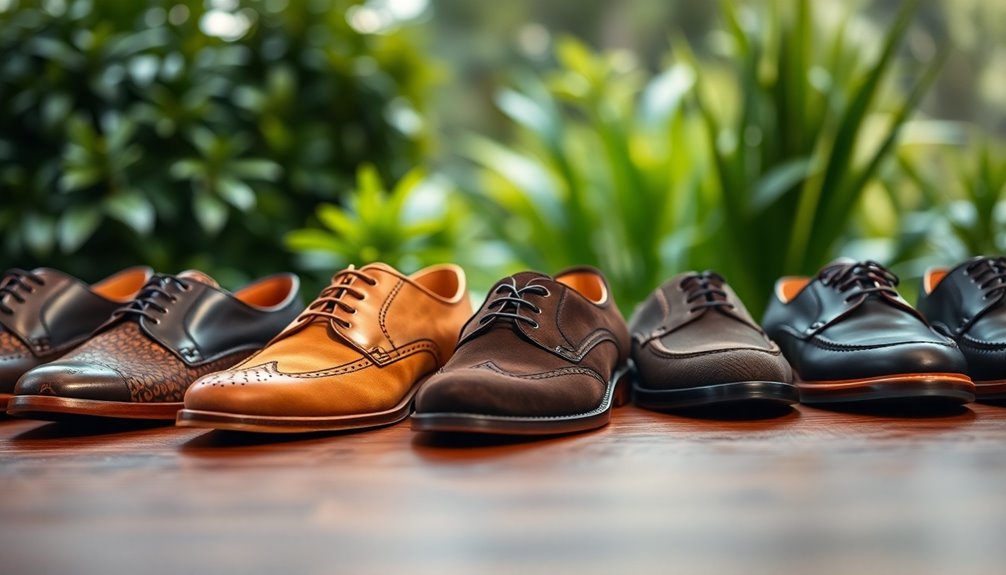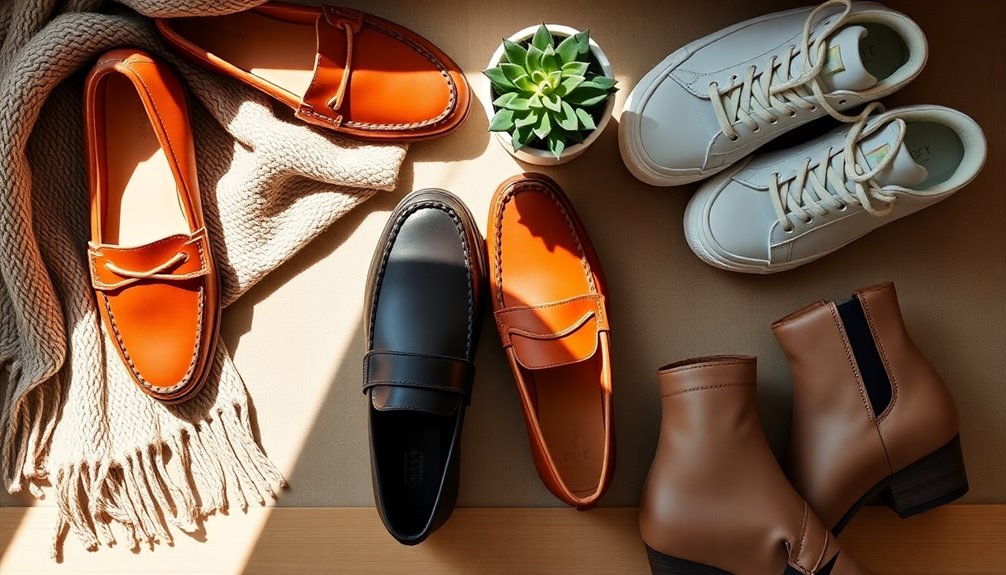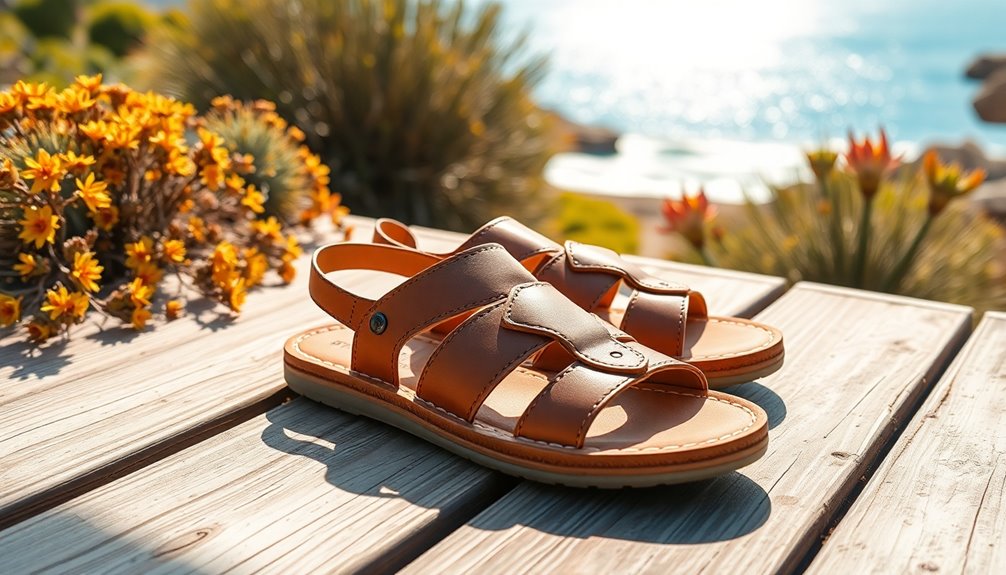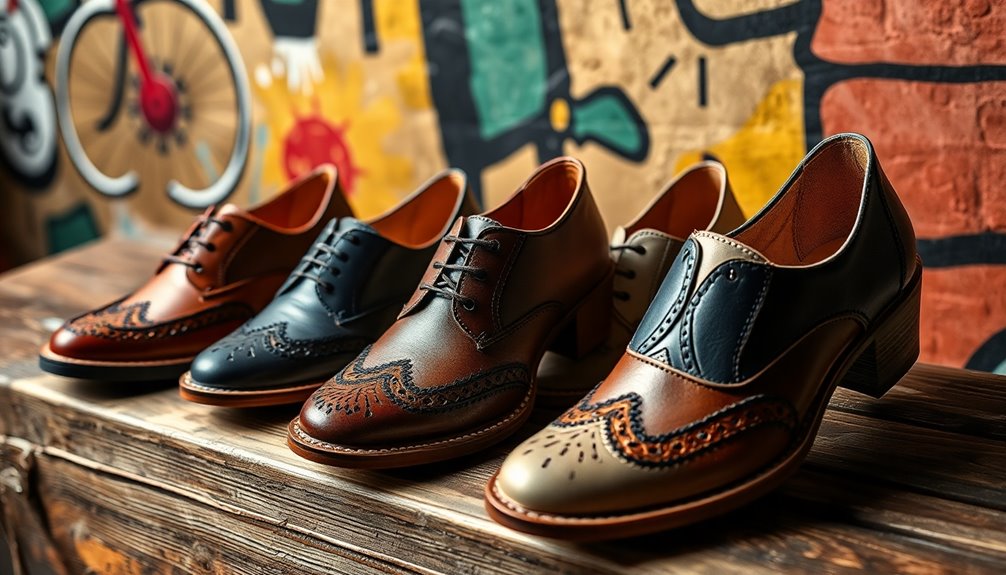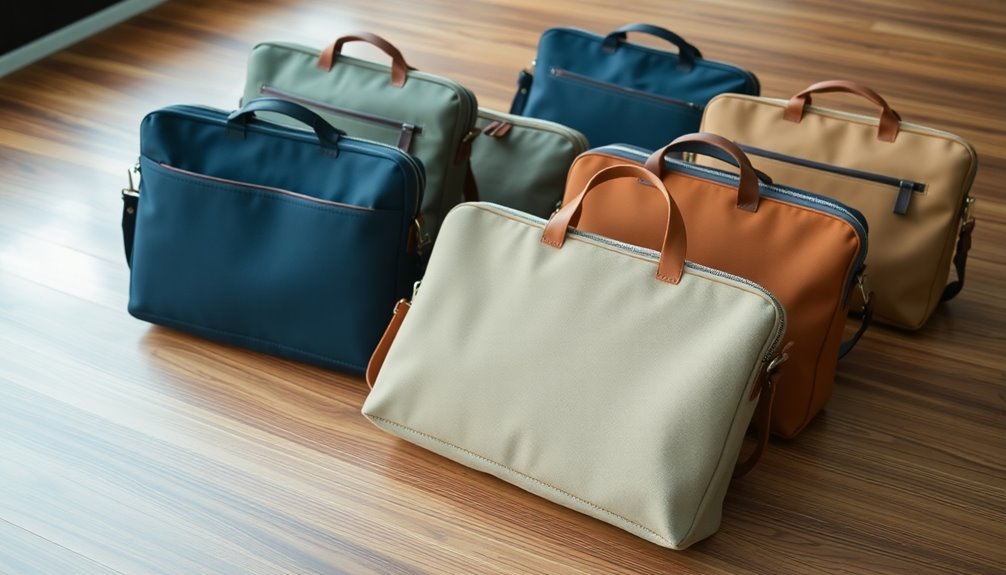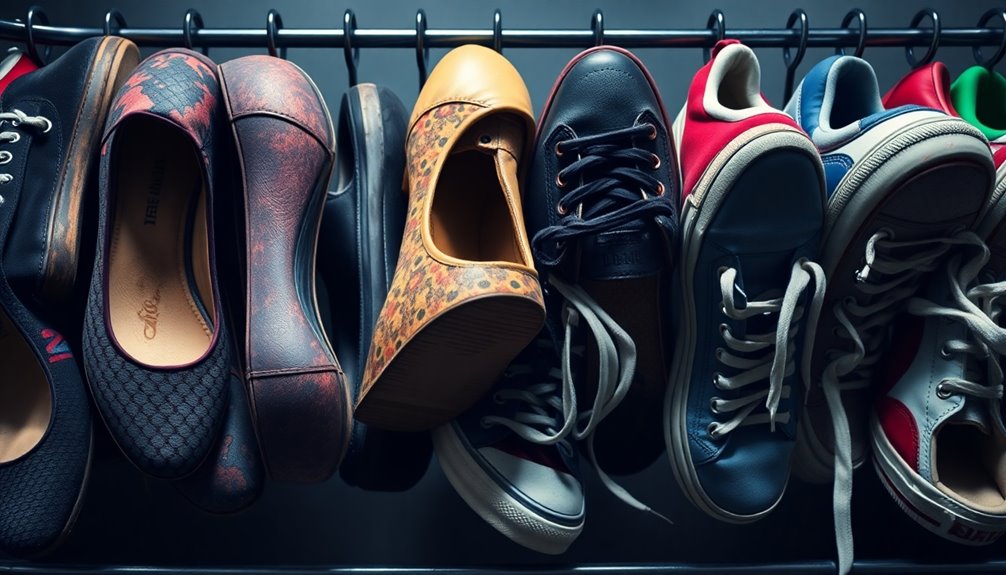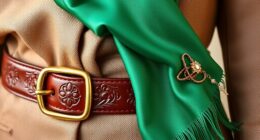In 2024, you'll find the best Dutch shoe brands that effortlessly combine tradition and modernity. Brands like Loints of Holland and ETQ Amsterdam prioritize comfort and quality, using premium, ethically sourced materials. You'll also see innovative designs from Filling Pieces and United Nude, reflecting street style and sustainability. As the market grows, many brands focus on eco-friendly practices, ensuring transparency and fair trade. With a rich heritage in quality footwear, these brands are making waves worldwide. Keep exploring to uncover more about their unique offerings and what sets them apart in the competitive landscape of Dutch footwear.
Key Takeaways
- Loints of Holland combines comfort and ethical production, using high-quality materials primarily sourced from Europe, appealing to eco-conscious consumers.
- Ethletic stands out for its commitment to sustainability, utilizing GOTS-certified organic cotton and pursuing Fairtrade certification in its production processes.
- Norm emphasizes transparency, incorporating up to 90% recycled materials and ensuring ethical practices throughout its supply chain.
- Filling Pieces and United Nude lead in avant-garde designs, reflecting contemporary trends while promoting diversity and innovation in footwear.
- The Dutch footwear market is projected to grow significantly, with increasing consumer demand for sustainable and ethically produced shoes driving brand evolution.
Historical and Established Brands

When you think of Dutch shoe brands, the historical roots of wooden shoes immediately come to mind. Dating back to around 1230 AD, these iconic wooden clogs were initially crafted for farmers and fishermen who needed protective footwear in harsh conditions. Made from durable hardwoods like alder and oak, early designs featured a wooden sole with leather straps to secure the foot. Their durability meant they were often passed down through generations.
However, the tradition of making these wooden shoes is fading, with only about 30 traditional clog-makers still practicing their craft. Multigenerational artisans have kept this art alive, but interest in continuing the tradition is dwindling. While modern factories like Nijhuis Klompen produce thousands of pairs daily, the handcrafted methods of yesteryear took several days to complete each pair.
Today, wooden shoes remain a symbol of Dutch heritage, recognized as safety shoes in the Netherlands. They're still worn by some farmers and outdoor workers, but their popularity now thrives largely among tourists, with about 300,000 pairs made annually for foreign buyers. The craftsmanship techniques used by these artisans emphasize durability and comfort, ensuring that each pair reflects the rich cultural significance embedded in Dutch footwear.
Fashion and Style Trends

Dutch shoe brands are at the forefront of fashion and style trends, blending innovative designs with cultural influences. Take Filling Pieces and United Nude, for instance; they push boundaries with avant-garde footwear that features unconventional silhouettes and extraordinary materials. Their shoes don't just serve a function—they make bold statements that resonate globally.
You'll also find brands like Daily Paper, which beautifully merge African heritage with contemporary street style. Their vibrant colors and bold prints celebrate diversity and encourage individual expression while maintaining a refined aesthetic. This blend of cultural influences enhances their appeal, creating footwear that stands out.
Streetwear and skate culture heavily influence many Dutch brands. Pop Trading Company captures the essence of skateboarding with functional designs that appeal to both skaters and fashion enthusiasts. Their effortless style is reflected in graphic tees and statement outerwear, making it easy for you to express your personality.
Moreover, the sustainability movement is rapidly gaining traction in the Dutch fashion scene, urging brands to adopt ethical production practices. Seasonal collections and interactive pop-up events keep things fresh, while sustainability and transparency shape a new model of luxury. With female purchasing power dominating the market, you're in for a treat with the variety and innovation these Dutch brands offer.
Comfort and Quality Features
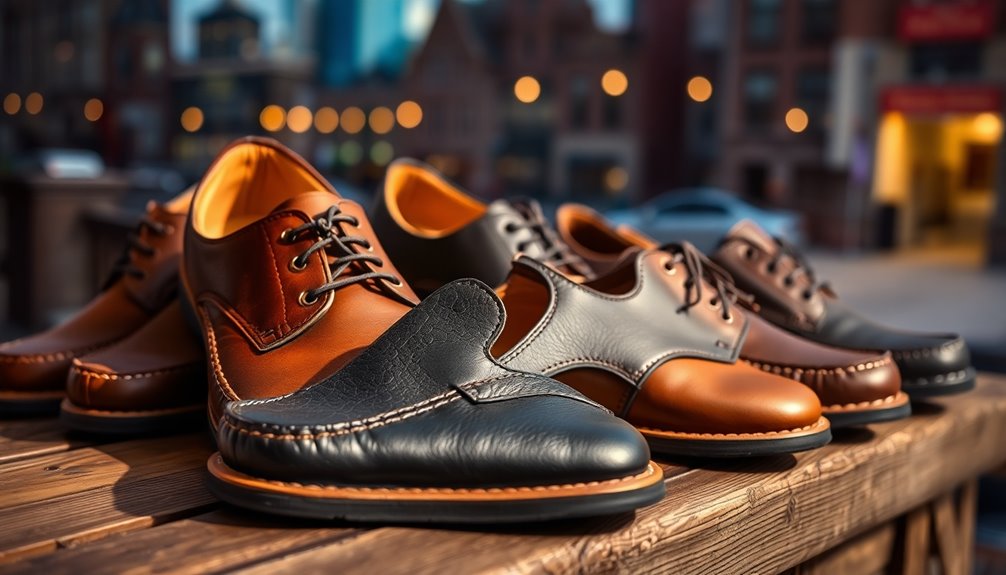
Finding the perfect balance between comfort and quality in footwear can be a challenge, but many Dutch shoe brands excel in this area. Loints of Holland stands out with its heavy emphasis on comfort. The thick, high-quality materials used in their shoes ensure durability and a perfect fit, allowing you to wear them comfortably across seasons. Plus, the lack of additional linings enhances wearability, making them a go-to choice for many.
When it comes to quality, Loints of Holland and ETQ Amsterdam use premium materials sourced primarily from Europe. This attention to material selection guarantees that your shoes not only feel great but also last a long time. Additionally, Loints of Holland offers free worldwide shipping, making it even more accessible to customers around the globe.
ETQ Amsterdam's meticulous craftsmanship ensures every stitch and seam is perfect, enhancing the overall quality of the footwear. Both brands also prioritize sustainability, with Loints of Holland focusing on ethical production and repairable designs, extending the lifespan of each pair.
With their commitment to comfort and quality, these Dutch shoe brands make it easy for you to invest in footwear that meets your needs without compromising on style or durability.
Market Presence and Accessibility
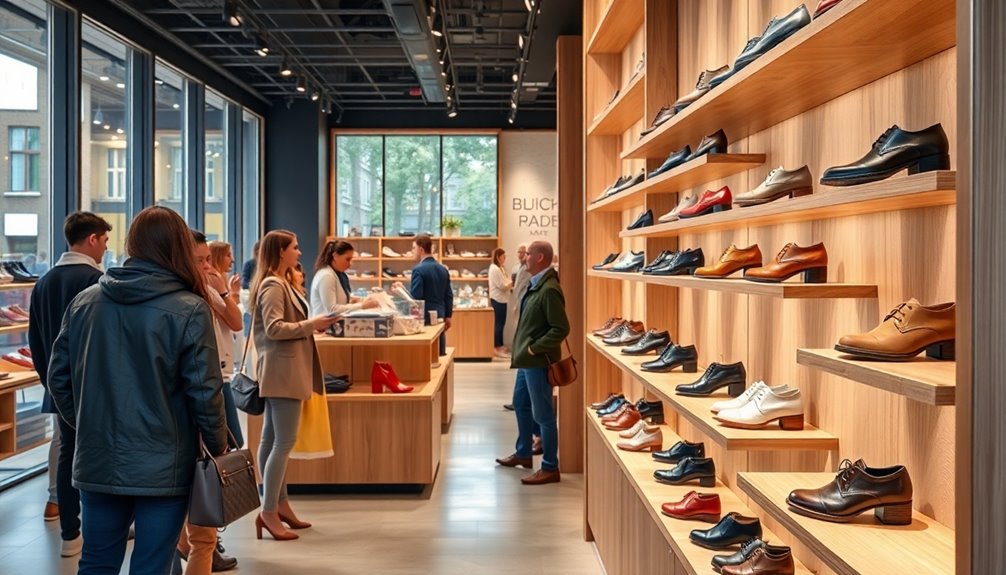
As the footwear market in the Netherlands continues to expand, reaching an expected value of USD 2.49 billion by 2025, accessibility becomes a key factor for consumers.
Women's shoes make up a significant portion of this market, reflecting the 50.3% female population. Key players like Asics, Under Armour, and Ecco are enhancing competition and ensuring a variety of stylish, quality options.
With urbanization on the rise and disposable incomes increasing, you'll find more purchasing power among consumers. Online shopping plays a crucial role, too—around 92% to 94% of the population uses the internet, fueling growth in online sales channels. The demand for stylish products is driving brands to innovate and offer unique designs.
Brands are responding by strengthening their distribution networks. For instance, Birkenstock is launching a showroom in Amsterdam to cater directly to Dutch consumers, while Hooijer Footwear Group manages several brands across the Benelux and beyond.
Retail and wholesale networks are also robust, with showrooms and trade fairs, like Gallery Shoes in Düsseldorf, playing vital roles in brand representation.
This combination of strong channels and high-quality offerings ensures that you have access to a wide range of options, enhancing your shopping experience in the Dutch footwear market.
Design and Innovation Highlights

The footwear industry in the Netherlands is making significant strides in design and innovation, focusing on sustainability and functionality. You'll find brands incorporating recycled materials like rubber tires and leather offcuts into their production processes. Ethically sourced materials, such as Leather Working Group-certified leather and Better Cotton Initiative-recognized cotton, are becoming standard. Innovative options like TENCEL™ Lyocell and bio-based sugarcane outsoles showcase a commitment to renewable resources. These brands are also adopting minimalistic designs and simplified manufacturing techniques to reduce waste. For example, the Wabi shoe is produced from a single piece of material, minimizing offcuts.
Furthermore, many of these brands are dedicated to creating products that are designed for circularity and longevity, reducing their environmental impact over time. Circular design principles are gaining traction, with shoes designed for disassembly and recyclability, ensuring they don't end up in landfills. Collaborations with premium brands like Vibram and Michelin lead to technically advanced footwear, while participation in events like Dutch Design Week spotlights their innovations.
Environmental and Ethical Practices
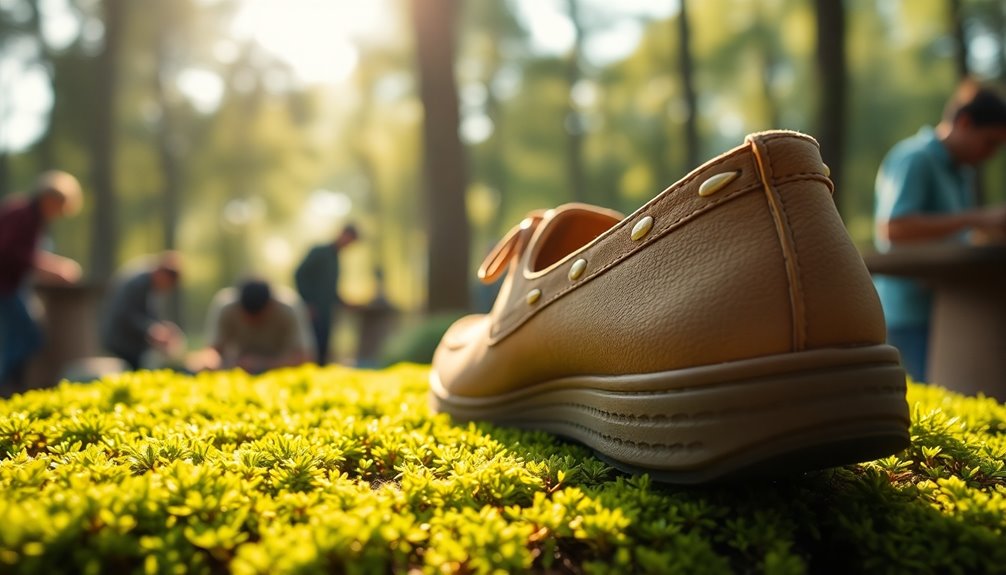
While many consumers prioritize style, it's crucial to recognize the growing emphasis on environmental and ethical practices within the Dutch shoe industry.
You'll find brands like PUMA leading the charge with their RE:SUEDE shoes, which utilize circular hemp fibers, reducing reliance on traditional materials. Norm takes sustainability a step further by incorporating up to 90% recycled materials, showcasing a commitment to the planet.
Ethletic stands out by using natural latex sourced from FSC-certified plantations, while Langbrett and Ethletic employ GOTS-certified organic cotton, ensuring responsible sourcing. In light of the industry's shift towards sustainable footwear production, many brands are actively seeking innovative solutions to reduce their environmental footprint.
Additionally, brands like Komrads utilize bio-based apple leather, recycled rubber, and cotton.
Innovative end-of-life solutions are also gaining traction. PUMA's composting initiative transforms shoes into Grade A compost, and Langbrett's take-back service encourages recycling and upcycling.
Norm's transparency in material disclosure and supplier practices reinforces ethical production, ensuring no child labor is involved.
With Fairtrade certification and a focus on animal welfare, brands like Ethletic and Vegetarian Shoes prioritize ethical practices.
Frequently Asked Questions
What Are the Price Ranges of These Dutch Shoe Brands?
When looking at Dutch shoe brands, you'll find a variety of price ranges.
For high-end options like Floris van Bommel, expect €200 to €500+, while brands like ETQ Amsterdam offer minimalist sneakers from €60 to €120.
Casual shoes can start around €40 with ETQ and go up to €200 for Fred de la Bretoniere.
Traditional clogs from Hollands Klompenhuis are quite affordable, priced between €8.95 to €30.
Keep an eye out for sales!
Where Can I Find Customer Reviews for These Brands?
You can find customer reviews for various Dutch shoe brands on their official websites, where real buyers share their experiences.
Additionally, platforms like Dressed.com and Highsnobiety aggregate reviews from multiple retailers, giving you a broader perspective.
Check major online shoe retailers too, as they often feature feedback on comfort and style.
Don't forget to explore social media, as many customers share their insights there!
Do Any Brands Offer Custom Shoe Options?
Yes, some brands do offer custom shoe options.
For instance, Timtur Custom Shoes provides handmade, bespoke designs using high-quality leathers. You can choose from a rich color palette to match your style.
Additionally, SneakerBranding allows full design customization for sneakers, including sustainable materials.
However, traditional Dutch clogs don't offer customization.
If you're looking for a perfect fit, explore these brands for unique and personalized footwear options tailored just for you.
Are There Any Dutch Shoe Brands Focusing on Kids' Footwear?
When it comes to Dutch shoe brands focusing on kids' footwear, you might find that there aren't many exclusively dedicated to this market.
While global giants like Nike and Adidas dominate, local brands like Hema offer children's options.
However, they don't specialize.
Instead, you'll notice a growing trend where parents prefer quality, comfort, and sustainability in kids' shoes, leading to a competitive landscape filled with both international and niche players.
What Are the Shipping Policies for These Shoe Brands?
When considering shipping policies for various shoe brands, you'll find some differences.
Red Wing Amsterdam ships across Europe and Africa, with costs based on destination and free shipping over €200.
AllSole provides worldwide delivery, excluding Russia and Ukraine.
Dutch Clogs ships globally with varied fees, while Loints of Holland offers free shipping everywhere.
Be sure to check specific processing and delivery times for your location to avoid surprises!
Conclusion
In conclusion, exploring the best Dutch shoe brands of 2024 reveals a vibrant mix of history, style, and innovation. Whether you prioritize comfort, quality, or ethical practices, there's a brand that fits your needs. By choosing these top performers, you not only elevate your wardrobe but also support sustainable craftsmanship. So, go ahead and step out in style, knowing you're making a smart choice for both fashion and the environment!
